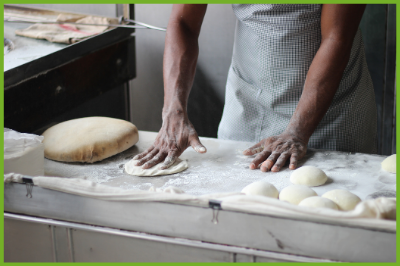
The influence of heat on sperm quality
Share
Are you used to sitting with your laptop on your lap? Do you turn the seat heat on maximum when you are in the car or are you potentially working in a high-heat environment?
Heat has an influence on male infertility according to the study “Male infertility among bakers associated with exposure to high environmental temperature at the workplace”[1]which included 137 male bakers with an age average of 32 years. The study showed that almost 23% of the male bakers were infertile. The temperature at the workplace was 37,4°C compared to a group of men working at 25,5°C, where the infertility rate was only 3%.

Why does heat affect male fertility?
Not many people know that thepurpose of testicles which produce sperm cells is depended on the temperature. The optimal temperature for the testicular function is 2-4°C below the body temperature.
The testes are being kept “cool” via 2 mechanisms. The first one is by the scrotum, which is the sack of skin around the testis. This is the first level responsible for temperaturechange. The second mechanism happens in the spermatic cord and it sounds exactly as it looks like. It has a cord-like structure and consists of fibers and tissues,[2][3]wherethe heat is exchanged by the blood flow in and out of the testes through the spermatic cord.[4]
Although the body’s intuitions are working like a Swiss watch,in situations of extreme heat the natural cooling mechanism of the scrotum may be ineffective.[5]Men, whose testes arefrequently exposed to high temperature, may result in changes in sperm characteristics.[6][7][8]
Most people have not thought about what happens to your male parts, when you are enjoying a ride in a heated car seat, because who would not get the most out of the “warm luxury” available in your car in the cold months.
A study on how heating car seats influence scrotal temperature was done by Andreas Jung at the University of Giessen in Germany and his colleagues. The study involved 30 healthy male volunteers, who sat in a heated car seat in two sessions for 90 minutes with two temperature sensors on each scrotal (sack of skin around the testis). The highest values were recorded already after one hourand the average scrotal temperature was 37,3°C, one man recorded the temperature of 39,7°C even though the optimal temperature should be 2-3°C under the body temperature. In comparison, the average scrotal temperature of volunteers sitting on non-heated car seats was 36.7°C.[9][10]
According to the leader of the study, Andreas Jung, the scrotal temperature of 37,3°C is enough to increase damage in sperm production.[11]
A significantly higher scrotal temperature has also been found among men who had a working laptop on the scrotum, especially when the legs were close together. A lap pad underneath the laptop was not found to eliminate the rising scrotal temperature. The least that can be done is to have legs apart and shorter use of a laptop on the scrotum.[12] [13]
In conclusion, we recommend to not overheat your “balls”. Even shorter periods of high temperature could affect your sperm production. Nowadays there are ways on how to keep your testes cool, like cooling gel pads or special cooling kits. You can find several products for this purpose, but you should always check with your doctor first.
And remember, keep it cool.
If you are curious about how good your sperm quality is, you can test yourself at home with the SwimCountTMSperm Quality Test, which is testing the only sperm cells that can fertilize an egg. You can also take the SwimCountTMSpermCare food supplements with important vitamins and minerals for male fertility.
[1]https://www.ncbi.nlm.nih.gov/pmc/articles/PMC6695025/
[2]Kim B., Park K., Rhee K. Heat stress response of male germ cells. Cell Mol Life Sci. 2013;70(15):2623–2636. [PubMed] [Google Scholar] [Ref list]
[3]Durairajanayagam D., Agarwal A., Ong C. Causes, effects and molecular mechanisms of testicular heat stress. Reprod Biomed Online. 2015;30(1):14–27. Epub 2014 Oct 12. [PubMed] [Google Scholar] [Ref list]
[4]https://healthengine.com.au/info/effect-of-environmental-factors-on-sperm-health
[5]https://www.bostonmedicalgroup.com/are-heated-car-seats-making-you-sterile/
[6]Kovats R.S., Hajat S. Heat stress and public health: a critical review. Annu Rev Publ Health. 2008;29:41–55. [PubMed] [Google Scholar] [Ref list]
[7]Nordkap L., Joensen U.N., Blomberg Jensen M., Jorgensen N. Regional differences and temporal trends in male reproductive health disorders: semen quality may be a sensitive marker of environmental exposures. Mol Cell Endocrinol. 2012;355(2):221–230. [PubMed] [Google Scholar] [Ref list]
[8]Skakkebaek N.E., Rajpert-De Meyts E., Buck Louis G.M. Male reproductive disorders and fertility trends : influences of environment and genetic susceptibility. Physiol Rev. 2016;96(1):55–97. [PMC free article] [PubMed] [Google Scholar] [Ref list]
[9]https://www.bionews.org.uk/page_90789#:~:text=Scientists%20from%20the%20University%20of,lower%20than%20core%20body%20temperature
[10]https://pubmed.ncbi.nlm.nih.gov/17919605/
[11]https://www.bionews.org.uk/page_90789#:~:text=Scientists%20from%20the%20University%20of,lower%20than%20core%20body%20temperature
